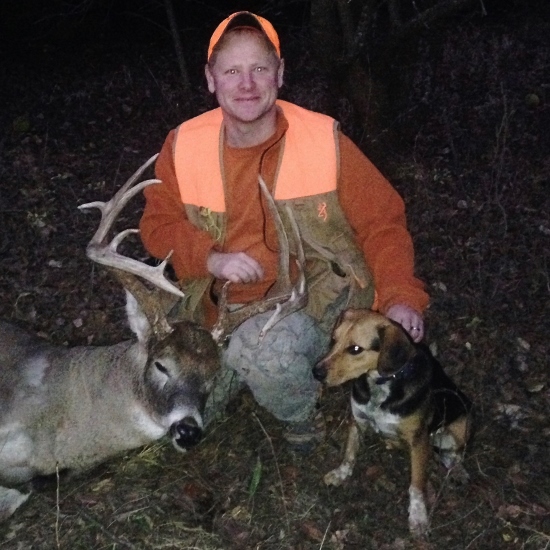My name is Brady, and I am the owner of High Caliber Blood Tracking in Monett, Missouri. I am an avid (sometimes obsessed) traditional bowhunter, dog lover, and outdoorsman. It was my passion for all of these things that guided my path into blood tracking. My story is not unlike many trackers I know. I never wanted to see a mortally wounded animal go unrecovered.
As a hunter, I had experienced the anguish of being unable to recover an animal that I had arrowed. After all the hours of practice, all the days in the stand, all the years of commitment to making myself the best hunter that I could be, I had still on rare occasion found myself at the end of a trail with no more blood and no game.
The fall of 2008 was one of those times. I jumped a single lung shot buck from his bed, and never saw him again. I fretted the loss for weeks, but my frustration blossomed into determination. Determination that I would take even more measures to keep such a loss from ever happening again.
I grew up a dog guy. I had many different breeds of working dogs and hunting dogs over the years. Now I was intent on owning a blood tracking dog. I had read about them occasionally in an obscure article of one hunting magazine or another. I had also heard of other hunters who had dabbled with the use of one local hound or another to aid in the recovery of deer that they had struggled to find on their own. Unfortunately, I didn't know of anyone who had successfully trained a dog for such a task.
I began researching everything that was available at the time, even using online translators to read articles from European countries where blood tracking had been widely used for centuries. Articles were limited, but they were available. Then I came across the "Bible" of blood tracking books, Tracking Dogs For Finding Wounded Deer, by John Jeanneney. I contacted the author and ordered a hard back copy right away. When it arrived, I read the book cover to cover 3 separate times, which fed the fire that was already smoldering within me. I also began to research specific breeds of dogs best suited for tracking and my lifestyle.
Then in the fall of 2009, I took the plunge and bought my first dedicated tracking dog, Caliber. Caliber was a wachtelhund, a German versatile spaniel typically used for a variety of tasks including hunting upland birds, waterfowl, wild boar, and you guessed it...scent tracking. His training began a few weeks after he arrived home, and so too did my journey into blood tracking.
Caliber recovered several deer his first season, and I soon realized that this was a resource that was too valuable to keep to myself. I was also surprised by how much fun I had recovering lost game not only for myself, but also for others. Tracking became almost as much fun as my own personal pursuit of game.
In the seasons that followed, Caliber recovered numerous deer for hunters in Missouri, Kansas, and Arkansas. Sadly, my loyal buddy past away after a long successful career.
Always looking to up my tracking game, I bought and trained a number of tracking dogs, including a Bavarian mountain hound, a couple of mixed breeds, and now a pair of Hanoverian hounds.
During the early days of tracking legalization in Missouri, I mentored a number of trackers in my area. Soon I found myself helping train dogs for friends and then friends of friends. As word spread, I began getting calls from trackers from across the country. That’s when my professional tracking dog training journey began.
I now offer training services for a limited number of dogs per year. Training consists of 3 month blocks where we work through a stepwise process to introduce the dog to game animal recovery. Training is primarily done using interdigital gland scent, and most dogs will be following 18-24 hour old hoof tracks with confidence when they complete the course. Of course every dog is different, but most will meet this objective. This provides the handler with a dog that is well started, and generally requires a lot less time intensive handler work going into its first season.
Every training block ends with a handler’s course where the handler will get a chance to work his new tracker on a challenging mock track while receiving valuable information from the trainer. Current cost of the 3 month training course is $2500. If you are interested in learning more, please contact me by phone, text or email.
I continue to offer tracking services in Missouri, Arkansas, and Kansas. I am also a licensed drone pilot, and offer thermal drone services as an adjunct to my recovery dog services. For most game recovery the dog still provides a higher success rate, but a thermal drone adds some usefulness when applied properly. We hope that you never require our services, but we are happy to help you out if that time comes.
Good Hunting! Brady
Ephesians 2:8-9, "For it is by grace that you have been saved, through faith-and this is not from yourselves, it is the gift of God -not by works, so that no one an boast.

